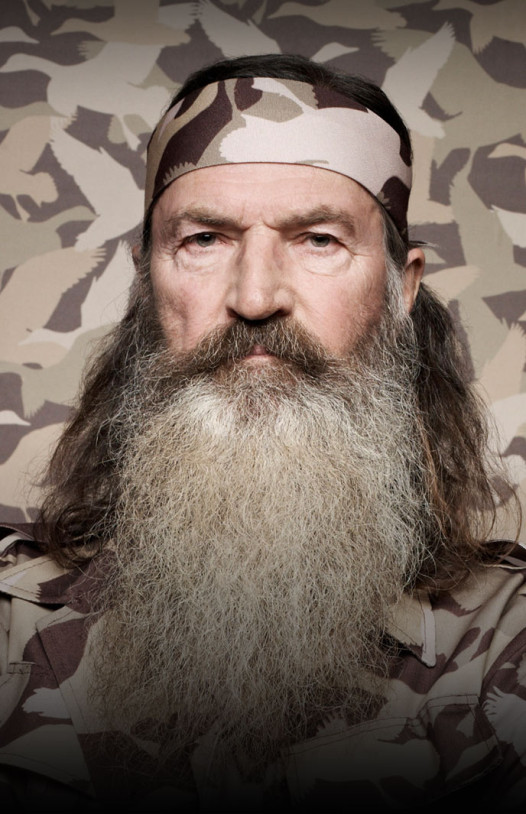
‘Duck Dynasty’ patriarch Phil Robertson
I’m not above pleasurable but mindless pursuits. Some I embrace: beach books, Angry Birds, sudoku.
But I couldn’t force myself to pick up the remote when the brief but embarrassing The Governor’s Wife hit the airwaves this fall. Not because it starred Edwin and Trina Edwards – he, at least, is always good for a quip and a laugh. No, because it once again painted Louisiana as a land of losers.
Entertaining losers, but losers just the same.
For the same reason, when Duck Dynasty hit the airwaves, I passed. Perhaps growing up in DeRidder, La., population 12,000, made me overly sensitive to rural stereotypes. I hate the idea of Southern residents in general, and Louisiana ones in particular, being portrayed as uncouth, outspoken, squirrel-eating oafs. (Swamp People, take note.)
I realize that I’m in the minority here. Duck Dynasty draws 14.6 million viewers per episode, and produced almost $80 million in ad revenue for A&E this year. (The cable network created as the genteel Arts and Entertainment, but that’s another story.)
At a recent Saints game, I spied a stocky, casually dressed, shaggy haired and bearded guy on the sideline among all the players. Duck Dynasty, I thought. And it was. Such is the power of TV: From backwoods unknown to sideline VIP in a matter of months.
When GQ recently published a controversial interview with Duck Dynasty patriarch Phil Robertson, the show really hit the national radar. In the article, among other rants, Robertson draws parallels between homosexuality and bestiality.
Hopefully, a majority of readers found his words offensive. Hopefully, a majority found his phrasing objectionable – enumerating male and female body parts in coarse ways that, frankly, I would think GQ editors should have been squirming over.
But. Are we missing the big picture here?
That picture has little to do with Duck Dynasty, and everything to do with us. With what we watch and who we revere.
Yes, he ranted against gays – and adulterers, male prostitutes, drunkards, swindlers. Are you surprised? Given that show, and that character?
The focus should not be on what Robertson said, but on what his words say about him. And about us, for listening to them. For giving him an audience.
My husband, an attorney, rants against political correctness. The idea that we can’t say what we really think because it’s not, well, PC, to do so. To an extent, I agree. Robertson and every other American has the right to say pretty much whatever he or she wants to. As a journalist, free speech is way up there on my untouchable list.
But. We Americans don’t have to listen to whatever nonsense people exercising their free speech muscles send out there. We don’t have to elevate them by turning them into cultural icons. That gives them stature. That gives their words … credibility.
We don’t have to laugh at ugly jokes, or tolerate them in our presence. We can turn the channel when yet another reality program trots out cruel stereotypes: the homophobic backwoods conservative, the racist Southern cop behind mirrored shades, the overbearing stage mom, the desperate fattie, the rich bitch housewife.
We can’t blame the citizens or the actors for seeking their 15 minutes of fame. But we can blame ourselves for riding their coattails along the way.
The saddest part, to me, of Phil Robertson’s brief time in the spotlight was not what he said, but what happened next. After suspending him for his anti-gay comments, A&E re-instated him to the show on Friday – after receiving a petition with 250,000 signatures calling for his return. Among his supporters: Sarah Palin and Bobby Jindal.
Those two names don’t surprise me. But the others do. Because as long as we keep tuning in to people like Phil Robertson, they will keep talking.
 NOLAbeings Multimedia artist Claire Bangser created NOLAbeings as a portrait-based story project that marries...
NOLAbeings Multimedia artist Claire Bangser created NOLAbeings as a portrait-based story project that marries...  Voodoo in New Orleans: Reviving history: New Orleans fortune telling This article takes a deep dive into the history of Voodoo in New Orleans, its hybridization with Catholicism, and its present-day place in the city's culture. The author visits fortune-tellers in the French Quarter, using their guidance as a tool for introspection rather than a deterministic predictor of the future. Through her experiences in New Orleans, the author feels a mystical connection to both the past and the future.
Voodoo in New Orleans: Reviving history: New Orleans fortune telling This article takes a deep dive into the history of Voodoo in New Orleans, its hybridization with Catholicism, and its present-day place in the city's culture. The author visits fortune-tellers in the French Quarter, using their guidance as a tool for introspection rather than a deterministic predictor of the future. Through her experiences in New Orleans, the author feels a mystical connection to both the past and the future. 